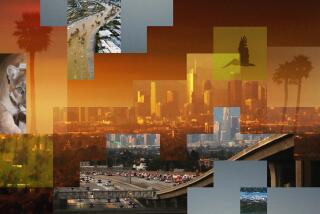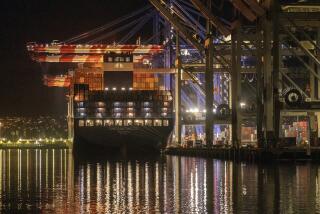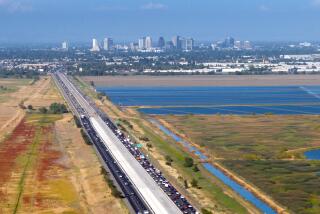Opinion: Can Southern California, built for cars, be reworked to encourage behavior that combats climate change?
To the editor: I am a native of Southern California. I came of legal driving age in the 1960s during the era of car songs by the Beach Boys and Steve McQueen’s cars and car movies. Randy Newman’s “I Love L.A.” later on made it clear that SoCal was still about cars. (“Entitled drivers are getting in the way of California’s climate change efforts,” editorial, Sept. 20)
As I write this, it’s almost time to take my 1968 V-8 Mustang out for its daily exercise. I’ve been driving that car for nearly 50 years, and it’s in pristine condition. I get a lot of thumbs up from other drivers and pedestrians when I pass by in that Mustang. And why not? Southern California is about cars, not walking and bicycling. This isn’t Amsterdam.
If folks are seriously concerned about their safety when walking or bicycling, then a reasonable preventive measure would be to simply pay closer attention to vehicles operating on the roads. Of course, that may require that cellphones be tucked safely away.
If that’s too hard, relocating to Europe may be just the ticket.
Bud Grubbs, Corona del Mar
..
To the editor: The push to repeal the gas tax increase that will fund road repairs is ridiculous, and here is why:
The increase amounts to 12 cents per gallon. The average car on the road in the United States got about 22 miles per gallon in 2015, and the typical California motorist drives about 14,000 miles per year. Knowing these two numbers, we can reasonably assume that a California driver can expect to buy 636 gallons of gasoline per year (or less, given the improvements in vehicle fuel economy).
People who drive cars need to appreciate that they can access any street in our city with relative safety.
— Kent Strumpell, Los Angeles
Therefore, the average driver in California will spend about $76 per year in additional taxes.
According to TRIP, a Washington-based transportation research organization, the poor quality of roads in our state costs each California motorist $760 per year in repair costs. I will gladly pay $76 per year to potentially save $760.
Carter Bravmann, Los Angeles
..
To the editor: The Times seems to view driving a car as a luxury or vice that should be limited. But no one drives in L.A. because they want to; it’s a horrible experience. We drive because we must.
The vast majority of us don’t live close enough to work to bike or walk, and for many people mass transit is unacceptable. The Times recognizes that anti-car ideologues are out of alignment with most of the public, yet it still states its anti-democratic hope that politicians will stick to a course of action that makes most of their constituents’ lives worse.
If politicians and The Times want people to take mass transit, then the answer is to make it useful, not merely to make driving worse.
David Garrett, Los Angeles
..
To the editor: People who drive cars need to appreciate that they can access any street in our city with relative safety. The same cannot be said for cyclists, pedestrians and transit users who often face traffic dangers or lack of facilities that deny them safe access to our public right-of-ways and the many destinations located along them.
The recent Vision Zero roadway reconfigurations amount to minor reallocations of public property to address this inequity. The real problem is that cars demand so much space that they have crowded out much-needed mobility options. We are in a difficult transition period to correct this.
As your editorial notes, meeting our climate change goals hinge on this transition succeeding. Let’s hope our neighbors who drive recognize that their future also depends on our roads working for everyone, not just cars.
Kent Strumpell, Los Angeles
The writer is a member if the city of Los Angeles Bicycle Advisory Committee
..
To the editor: We’ve had multiple devastating hurricanes, sea and ground temperatures keep setting record highs, polar ice is retreating, and The Times hopes that the state can “persuade” more residents to drive less or use electric cars.
This would be like Franklin Roosevelt awaking on Dec. 8, 1941, wondering how he could persuade enough Americans to join the armed forces to successfully fight Nazi Germany and Imperial Japan.
Bill Seibel, Glendora
Follow the Opinion section on Twitter @latimesopinion and Facebook
More to Read
A cure for the common opinion
Get thought-provoking perspectives with our weekly newsletter.
You may occasionally receive promotional content from the Los Angeles Times.










